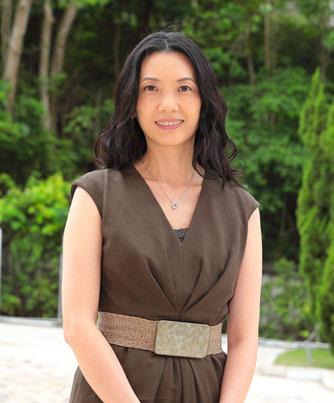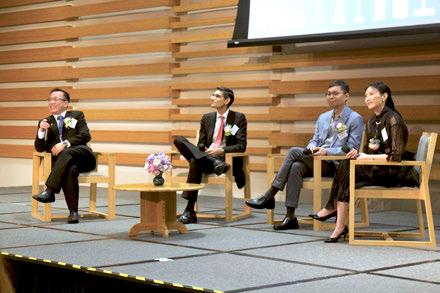
5 minute read
Integrating Cultural Study into Management - Interview with Professor Jeanne Fu 將文化研究融入管理-符可瑩教授專訪
Integrating Cultural Study into Management 將文化研究融入管理
Interview with Professor Jeanne Fu 符可瑩教授專訪
Advertisement
Head of Department of Management Head of Honours Academy 管理學系系主任 榮譽學院院長
While making profit is a key performance indicator, the success of a commercial institution also relies heavily on whether different people constituting the organisation get to unleash their potential and carry out their duties efficiently. Professor Jeanne Fu studied Management for many years after completion of her Psychology major, and she is especially interested in the cultural side of management, including cultural cognition, cross-culture management, and cultural psychology. In the early days of her research, Hong Kong people were a pivotal group of research subjects for these areas. “From the perspective of cultural cognition, human behaviours are affected by their cultural upbringing and the worldviews they acquire through socialisation. For people who have lived in two cultures for a significant amount of time in their life and are profoundly affected by such cultures, cultural psychologists call them biculturals. For example, when a ChineseAmerican bicultural sees symbols of Chinese culture, s/he may be inspired and inclined to think or act in a Chinese way; on the other hand, when s/he sees symbols about American culture some other time, his/her behaviour will tend to be more American-like. In fact any one of us can acquire different cultural mindsets and the resultant behavioural repertoire could be very dynamic.” “Taking the values of ‘Collectivism’ and ‘Individualism’ - giving priority to the interests of a group versus those of an individual, as examples, these two values may not necessarily go hand-in-hand in a person’s mind at first glance. Yet in cultural cognition, a Hong Kong bicultural can display behaviours related to both of these values because Hong Kong people are familiar with both Chinese and Western cultures and possess both types of cognition simultaneously. Other similar groups of bicultural individuals include American-born Chinese, or Asians with foreign nationalities.” Professor Fu says. “They grew up in foreign countries, where they would speak English with their peers in school, while speaking their mother tongue with their family members at home. Research shows that biculturals are capable of switching between cultural worldviews and are more flexible when facing organisational changes. Yet bicultural individuals at times experience confusion and incompatibility of the two worlds and may even feel shocked at their own changing behaviours.” Professor Fu explains that this type of study about cultural cognition is very useful when applied to human resources management in an organisation. “There are different ways of handling conflicts in different cultures. For example, Chinese people are used to adopting mediation, or they will seek help from a third party to avoid direct confrontation; while Americans don’t mind debates or even direct confrontations. Studies in cultural cognition are beneficial for the break-in and management of a cross-cultural team, allowing sparks within the team while maintaining a balance without causing serious conflicts, thus enhancing work efficiency and leadership.” 商業著重營利,惟商業機構由各式各樣的人員 組成,他們能否發揮所長、各司其職,對公司 的成敗至為關鍵。本科主修心理學的符可瑩教 授,鑽研管理學多年,對於當中涉及的文化影 響如文化認知、跨文化管理與文化心理學等特 別有興趣。在她早期的研究裡,香港人在這些 方面是不可或缺的研究對象。
In addition to business study, Professor Fu’s expertise in management also applies to driving student development. Taking on the role of Head of Honours Academy (HA) since last year, she hopes students can enhance their interpersonal skills and be devoted to service-learning and community engagement through participating in HA curriculum. “HA students are very talented in their areas of study, yet they may not have the right channels to try out their innovative ideas or prosocial intentions. Based on the development and preference of individual students, HA is there to offer them various support, resources and opportunities, including workshops, internships, competitions, or social networks to help them actualise their career and social ambitions. Dr Holly Chung and Ms Esther Lee, the two Associate Heads of HA, and I offer up close coaching for our students.”
Professor Fu says despite the pandemic, HA students still had treasurable opportunities to have face-to-face activities, such as firm visits or workshops with social enterprise. “The pandemic has had some negative impact on students’ social life and networking. Comparatively, HA students were able to connect with fellow classmates, the University and the community through HA activities and have not become out of touch. Soft skills like leadership skills, communication skills, and teamwork can only be cultivated when you have interactions with people. You will then learn how to resolve conflicts and balance the interests of different parties.” Having taught in Hong Kong for several years, Professor Fu thinks that Hong Kong students are flexible, courageous to try new things, and creative. She is particularly impressed by the diligence of HSUHK students. “There was an incident in my first semester in HSUHK. At that time my lecture started at 12 noon. One day a student approached me timidly asking, ‘Excuse me, Professor, do you mind if I sit at the back and eat my sandwiches? I have no lunch time in my 9-hour time-table.’ Later I discovered that some other students were in the same situation because they needed to arrange time for parttime jobs to ease their families’ financial burden. Nevertheless, they were very eager to learn and didn’t want to have their lunch at the expense of a few minutes of a lecture.” Professor Fu thus learnt of the financial difficulty of studying in a self-financing institution. “Students come from different family backgrounds and resources and it is good to know that students have had subsidised tuition from the government in recent years.” 符教授在管理學上的專長,除了應用於商學研 究,亦幫助學生發展。自去年起擔任恒大榮譽 學院(HA)院長,她希望同學能透過這個培訓 計劃,提升人際技巧,及投入服務學習和社區 參與。「HA同學本身已有豐富的本科專業知 識,他們可能有一些想法或有益社會的取向, 但欠缺試行的機會。所以HA會因應個別同學 的發展和喜好,為他們提供不同的配套、資源 和機會,例如工作坊、實習、比賽,或社區網 絡等,讓他們實行其事業和社會志向。我和兩 位副院長鍾可盈博士和李德芬女士共同負責跟 進及提供指導。」
在港教學多年,符教授認為香港學生靈活變通、 勇於嘗試,亦很有創意。她對恒大學生的努力 印象尤深。「我記得那是我剛加入恒大的第一 個學期,其中一班是在中午12時上課的。有天 一位同學靦腆地問我:『教授,不好意思,你 介意我坐在後排吃三文治嗎?因為我今天上九 小時的課,沒時間吃午餐。』 後來我發現還有其他同學也 是這樣的情況,因為他們要 安排時間做兼職,減輕家裡 負擔,因此上課時間表都排 得密麻麻。其實他們很想學 習,不想因為吃午飯而耽誤 課堂,哪怕只是幾分鐘的課 堂。」符教授由此了解到自 資院校同學在財政上的困難。 「學生們各有不同的家庭背 景和資源。近年來政府為學 生提供更多學費補貼,絕對 是造福學生。」
Professor Fu (1st from right) participates in a HSUHK forum. 符教授(右一)參與恒大論壇。


Professor Fu (middle at the front) pictures with students of BBA in Global Business Management. 符教授(前排中)與環球商業管理工商管理課程學生合照。










